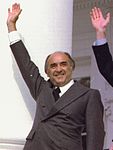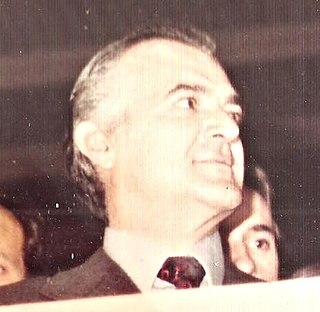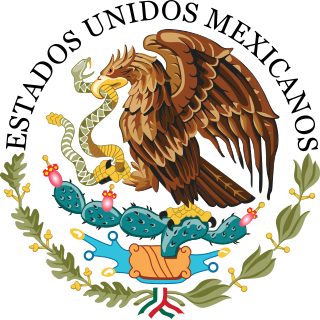Background and elections
Amidst a social and economic crisis, president Luis Echeverría appointed his finance minister, José López Portillo, as the candidate for the ruling PRI in the 1976 presidential elections. Before the electoral reform of 1977, only four political parties were allowed to participate in the elections: the ruling Institutional Revolutionary Party (PRI), the Popular Socialist Party (PPS), the Authentic Party of the Mexican Revolution (PARM) and the right-wing National Action Party (PAN), which was practically the only real opposition party at the time. [5]

Luis Echeverría Álvarez is a Mexican politician affiliated with the Institutional Revolutionary Party (PRI) who served as the 50th President of Mexico from 1970 to 1976. At 97, he is currently the oldest living former Mexican president.

The Popular Socialist Party is a communist party in Mexico. It was founded in 1948 as the Popular Party by Vicente Lombardo Toledano.

The Authentic Party of the Mexican Revolution was a Mexican political party that existed from 1955 to 2000. PARM was generally considered a satellite party of the governing Institutional Revolutionary Party (PRI).
The PPS and the PARM supported López Portillo's candidacy, as they had traditionally done with previous candidates for the PRI.
At the time, the opposition party PAN was going through internal conflicts and, for the first time upon its foundation, was unable to nominate a candidate for the 1976 presidential elections.
On the other hand, the Mexican Communist Party nominated Valentín Campa as their presidential candidate. At the time, however, this party had no official registry and was not allowed to participate in elections, so Campa's candidacy was not officially recognized and he didn't have access to the media. He had to run as a write-in candidate, as he would not appear in the ballots. [6]
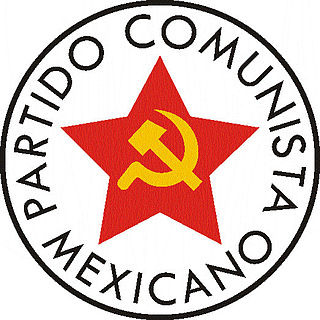
The Mexican Communist Party was a communist party in Mexico. It was founded in 1917 as the Socialist Workers' Party by Manabendra Nath Roy, a left-wing Indian Bengali intellectual. The PSO changed its name to the Mexican Communist Party in November 1919, following the Bolshevik Revolution in Russia. It was outlawed in 1925 and remained illegal until 1935, during the presidency of the leftist Lázaro Cárdenas. The PCM saw in the left wing of the nationalist regime that emerged from the Mexican Revolution a progressive force to be supported –i.e. Cárdenas and his allies. In the end, the PCM disappeared after joining a split from the PRI led by the son of Lázaro Cárdenas, Cuauhtémoc.
Valentín Campa Salazar was a Mexican railway union leader and presidential candidate. Along with Demetrio Vallejo, he was considered one of the leaders of the 1958 railway strikes. Campa was also the founder of the National Railroad Council, and the defunct underground newspaper The Railwayman.
A write-in candidate is a candidate in an election whose name does not appear on the ballot, but for whom voters may vote nonetheless by writing in the person's name. The system is almost totally confined to elections in the United States. Some U.S. states and local jurisdictions allow a voter to affix a sticker, with the write-in candidate's name, to the ballot in lieu of actually writing in the candidate's name. Write-in candidacies are sometimes a result of a candidate being legally or procedurally ineligible to run under his or her own name or party; write-in candidacies may be permitted where term limits bar an incumbent candidate from being officially nominated for, or being listed on the ballot for, re-election. In some cases, write-in campaigns have been organized to support a candidate who is not personally involved in running; this may be a form of draft campaign.
These factors led to López Portillo effectively running unopposed. His campaign echoed this "unanimous" support for him, and his slogan was "La solución somos todos" ("All of us are the solution"). López Portillo later joked that, due to running without opposition, it would have been enough for "his mother's vote for him" to win the election. [7]
The elections took place during a tense period: the economic crisis, the leftist guerrilla sublevations in some parts of the country and the Dirty War the government took against them, were some of many factors that jeopardized the power of the ruling PRI.
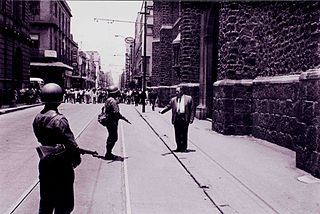
The Mexican Dirty War refers to the Mexican theater of the Cold War, an internal conflict between the Mexican PRI-ruled government, backed by the US, and left-wing student and guerrilla groups in the 1960s and 1970s under the presidencies of Gustavo Díaz Ordaz, Luis Echeverría and José López Portillo. During the war, government forces carried out disappearances, estimated at 1,200, systematic torture, and "probable extrajudicial executions".
There were many rumours that outgoing president Luis Echeverría was planning to carry out a coup d'état against his own candidate, López Portillo, to perpetuate himself in power. A month after the elections, a diplomatic cable sent by then American ambassador in Mexico, Joseph J. Jova, to the U.S. Department of State echoed those rumours, and detailed a hypothetical scenario in which Echeverría would order the assassination of president-elect López Portillo after September 1, using the leftist guerrilla Liga Comunista 23 de Septiembre and the CIA as scapegoats. [8] On August 13, the Liga tried to kidnap Margarita López Portillo, sister of the president elect; the attempt failed and the Liga's leader, David Jiménez Sarmiento, was killed by security forces during the incident. [9]

A coup d'état, also known as a putsch, a golpe, or simply as a coup, means the overthrow of an existing government; typically, this refers to an illegal, unconstitutional seizure of power by a dictator, the military, or a political faction.

A diplomatic cable, also known as a diplomatic telegram or embassy cable, is a confidential text message exchanged between a diplomatic mission, like an embassy or a consulate, and the foreign ministry of its parent country. A diplomatic cable is a type of dispatch. Other dispatches may be sent as physical documents in a diplomatic bag.
Joseph John Jova (1916–1993) was an American diplomat. He served as United States Ambassador to Honduras from 1965 to 1969, United States Ambassador to the Organization of American States from 1969 to 1973, and United States Ambassador to Mexico from 1973 to 1977.
In the end, López Portillo took office as scheduled on December 1 without further incidents.
This page is based on this
Wikipedia article Text is available under the
CC BY-SA 4.0 license; additional terms may apply.
Images, videos and audio are available under their respective licenses.




